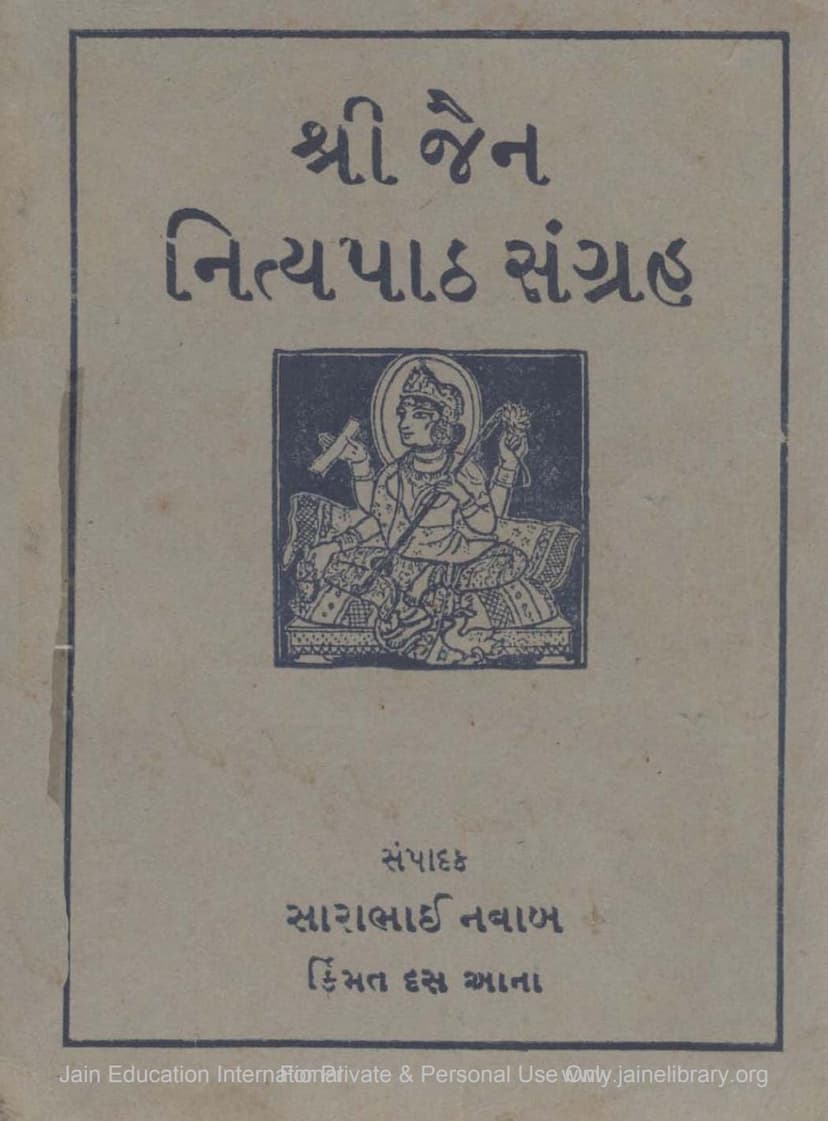Jain Nitya Path Sangraha
Added to library: September 2, 2025

Summary
Here's a comprehensive summary of the Jain Nitya Path Sangraha, based on the provided pages:
Book Title: Jain Nitya Path Sangraha (Collection of Daily Jain Prayers) Author: Sarabhai Manilal Nawab Publisher: Sha Kunvarji Hirji Naliya
Overview:
The "Jain Nitya Path Sangraha" is a compilation of essential daily prayers and devotional hymns recited by Jains. Edited by Sarabhai Manilal Nawab, this book serves as a guide for practitioners to engage in their daily spiritual routine. It aims to provide solace, protection, and spiritual well-being through the recitation of sacred verses. The book contains a rich collection of stotras (hymns) attributed to various esteemed Jain Acharyas and ancient texts, covering a range of devotional and protective themes.
Key Contents and Themes:
The book is structured as a collection of distinct stotras, each focusing on specific aspects of Jain philosophy and devotional practice. Based on the table of contents and the provided pages, the primary contents include:
-
Navkar Mantra (P-1): The foundational mantra of Jainism, the Panch Namokar, is presented as the primary auspicious beginning and the first "Smaran" (remembrance).
-
Uvassagaharam Stotra (P-1-2): Attributed to Bhadrabahu Swami, this stotra is a powerful hymn for warding off obstacles and calamities. It is considered the second "Smaran." The stotra invokes divine protection from various troubles and seeks blessings for a life free from suffering.
-
Santikara Stotra (P-2-4): Composed by Muni Sundarsuri, this is the third "Smaran." It is a hymn dedicated to achieving peace and tranquility, both internal and external. It mentions various celestial beings and divine entities that are invoked for protection and well-being.
-
Tijayapahur Stotra (P-5-7): This stotra, by Purvacharya, focuses on dispelling various fears and dangers. It enumerates different groups of Tirthankaras and their protective powers against afflictions like fire, water, disease, and thieves.
-
Chintamani Stotra (P-7-11): Attributed to Jilupati Suri, this hymn is dedicated to the "Chintamani" jewel, symbolizing the fulfillment of desires and the attainment of spiritual goals. It also appears to be a powerful protective mantra.
-
Ajitashanti Stava (P-15-20): This stav (hymn) is dedicated to Tirthankara Ajitnath and focuses on achieving peace and overcoming negativity. It emphasizes the power of devotion and the virtues of Tirthankaras.
-
Bhaktamar Stotra (P-20-30): Composed by Manatunga Suri, this is one of the most revered hymns in Jainism. The pages show the beginning of this elaborate stotra, which is known for its miraculous power in removing obstacles, alleviating suffering, and bestowing blessings. It praises the qualities and powers of Tirthankara Parshvanath.
-
Kalyan Mandir Stotra (P-30-39): By Siddhasen Diwakar, this stotra is named "Kalyan Mandir" (Temple of Auspiciousness) and focuses on the path to liberation and spiritual well-being. It highlights the virtues and powers of Tirthankaras as a source of ultimate happiness.
-
Brihadashanti Stava (P-40-45): Composed by Shanti Suri, this is a comprehensive hymn for peace and well-being, likely invoking various protective deities and positive energies.
-
Grihashanti Stotra (P-46-47): Attributed to Bhadrabahu Swami, this stotra is specifically for achieving peace within the home and for astrological remedies related to planetary influences.
-
Laghuashanti Stava (P-47-50): Composed by Manavadewa Suri, this is a shorter hymn focused on peace and auspiciousness. It includes prayers to various divine feminine energies and blessings for the sangha.
-
Mantra Dhi Raj Stotra (P-51-55): by Purvacharya, this stotra is presented as a supreme mantra for protection and the fulfillment of wishes. It involves specific mantras and a connection to Tirthankara Parshvanath.
-
Chintamani Stotra (P-55-59): This hymn, also attributed to Jilupati Suri, is again presented, emphasizing its wish-fulfilling and protective qualities.
-
Rishimandal Stotra (P-65-72): This stotra is connected to sacred syllables, mantras, and the protection of the practitioner. It involves intricate arrangements of divine names and protective energies.
-
Jinpjar Stotra (P-73-82): Composed by Kamalprabhacharya, this hymn is designed to create a protective shield around the devotee, invoking various Tirthankaras for safeguarding different parts of the body and life.
-
Jayti Hu Annu Stotra (P-77-85): Attributed to Abhaydev Suri, this stotra praises the virtues and protective powers of Tirthankara Parshvanath, emphasizing his role as a remover of suffering and a bestower of happiness.
-
Padmavati Kavach (P-86-87): This is a protective armor dedicated to Goddess Padmavati, a Yakshini associated with Tirthankara Parshvanath, known for her power to ward off evil and fulfill desires.
-
Laghu Ajitashanti Stotra (P-88-91): This is a shorter hymn dedicated to Tirthankara Ajitnath and peace.
-
Gandhar Dev Stuti (P-92-96): This section includes praises for the Gandharas (disciples of Tirthankaras) and other divine beings associated with the Jain faith, seeking their blessings for the entire sangha.
-
Gurupa Tantra Stotra (P-97-99): This stotra seems to be an ode to the Guru and spiritual lineage, acknowledging the guidance and merits of respected Acharyas.
-
Singhum Avaha Stotra (P-100-102): This stotra likely invokes protective deities and seeks blessings for the sangha's well-being and prosperity.
Purpose and Significance:
The "Jain Nitya Path Sangraha" is intended to be a practical guide for Jains to maintain their spiritual discipline and seek protection from worldly afflictions. The collection of stotras and mantras provides a comprehensive set of prayers for daily recitation, covering themes of:
- Protection: From physical dangers, diseases, evil influences, and obstacles.
- Peace and Well-being: Internal peace, harmony in life, and overall prosperity.
- Spiritual Growth: Attaining liberation, fulfilling desires, and deepening devotion.
- Auspiciousness: Invoking blessings for oneself, family, community, and the world.
The book highlights the importance of devotion, reverence for Tirthankaras and Acharyas, and the power of sacred sounds (mantras) in the Jain tradition. The inclusion of various Acharyas as authors emphasizes the lineage of knowledge and spiritual authority within Jainism.